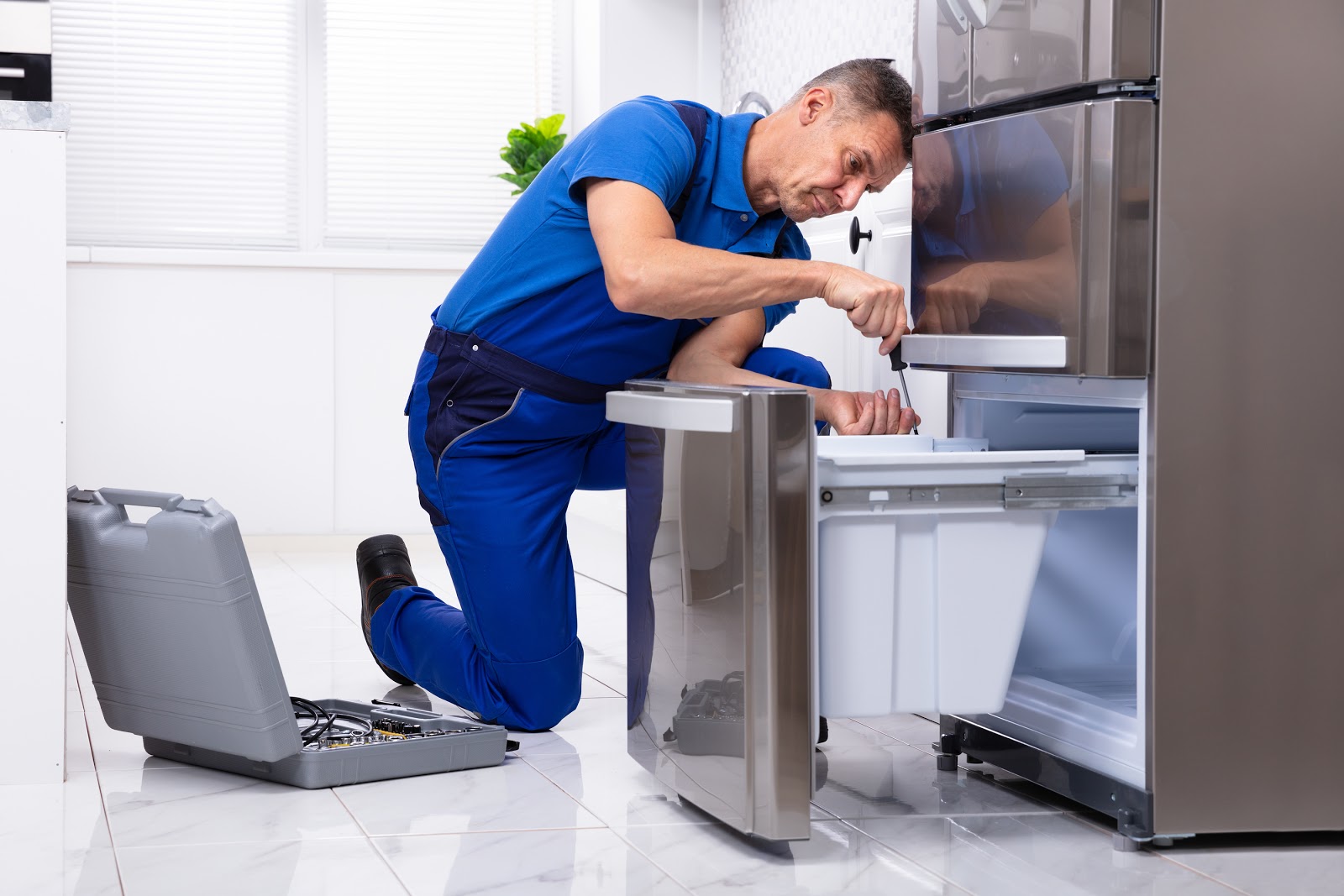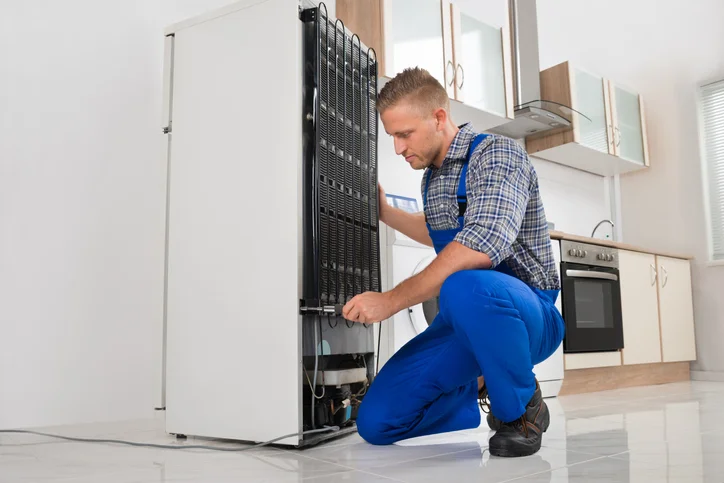Crucial Tips for Effective Ref Repair Service to Extend Home Appliance Life-span
When it concerns your fridge, correct repair service and maintenance are crucial for long life. You might not understand exactly how small concerns can escalate if they're left unaddressed. Regular examinations and easy solutions can save you from costly replacements down the line. Recognizing typical troubles and knowing when to act can make all the difference. Let's check out some essential suggestions that will aid you maintain your fridge running efficiently for years to come.
Comprehending Typical Fridge Problems
Fridges are important in keeping your food fresh, but they can experience a series of typical problems that disrupt their efficiency. One constant concern is insufficient air conditioning. If you see food spoiling quicker than usual, check the thermostat setups or take into consideration if the door seals are damaged. One more typical problem is excessive sound, which can show a malfunctioning compressor or a falling short follower. You may likewise experience water pooling inside or beneath the fridge; this typically results from a blocked defrost drainpipe or a malfunctioning water line. Additionally, if your refrigerator's light isn't working, maybe a basic light bulb issue or a problem with the door switch. Ultimately, ice buildup in the fridge freezer can prevent air flow and cooling down efficiency. Acknowledging these issues early can conserve you time and money in repair services, guaranteeing your fridge runs efficiently and effectively.
Normal Upkeep Practices
To keep your devices running smoothly, you need to remain on top of regular maintenance practices. Clean the condenser coils, examine the door seals, and check the temperature settings to ensure peak efficiency. These basic jobs can save you money and time on fixings down the line.
Clean Condenser Coils Regularly
Cleaning your condenser coils consistently can considerably boost your home appliance's efficiency. Dirt and dust develop on these coils in time, triggering your appliance to function tougher and eat even more energy. To maintain them tidy, unplug your home appliance and very carefully get rid of any safety covers. Use a vacuum with a brush attachment or a soft brush to carefully eliminate particles. If needed, a blend of cozy water and light cleaning agent can assist remove persistent crud. Make certain to let whatever dry totally before rebuilding and plugging the home appliance back in. Goal to cleanse your coils a minimum of twice a year, or more frequently if you have pets or live in a dusty environment. This straightforward job can expand the life expectancy of your home appliance significantly.
Inspect Door Seals
3 simple actions can aid you guarantee your device's door seals are in great problem. Evaluate the seals frequently for any splits, splits, or indications of wear. These damages can cause air leaks, influencing effectiveness. Second, tidy the seals using cozy, soapy water to remove any kind of particles or grime. A tidy seal ensures a tight fit and far better efficiency. Finally, carry out a straightforward test by closing the door on a paper. If you can easily pull it out without resistance, the seal may require changing. By complying with these steps, you'll maintain your device's performance and long life, conserving you money on energy costs and repair work in the future.
Monitor Temperature Level Setups
Regularly checking your home appliance's temperature settings is necessary for best efficiency and effectiveness. Whether you're taking care of a fridge, freezer, or stove, watching on these settings can protect against several problems. For refrigerators, purpose for temperature levels between 35 ° F and 38 ° F; for fridges freezer, stay 0 ° F. If the temperature levels are too high or low, your home appliance may function harder, squandering power and shortening its life-span. Utilize a thermometer to inspect these settings regularly, particularly after major adjustments, like relocating your home appliance or readjusting the thermostat. If you observe variations, change the setups accordingly and consult the user guidebook for assistance. By staying proactive concerning temperature level monitoring, you'll ensure your devices run efficiently and last longer.
Repairing Air Conditioning Problems
When your refrigerator isn't cooling properly, it can result in ruined food and wasted money, so attending to the problem immediately is important. Begin by checking the temperature level setups to validate they go to the suggested degrees, generally around 37 ° F for the fridge and 0 ° F for the fridge freezer. If the setups are right, inspect the door seals for any kind of gaps or damage; a malfunctioning seal can permit cozy air to get in.
Next, check out the vents inside the fridge and fridge freezer. Confirm they're not blocked by food products, as this can interrupt air movement. Listen for the compressor; if it's not running or making uncommon noises, it might need attention. Lastly, inspect the Resources condenser coils, normally situated at the back or bottom of the unit. Dirt and debris can build up, triggering cooling down problems. Tidy them with a vacuum cleaner or brush to maximize performance. If issues continue, it could be time to call an expert.
Repairing Water Leakage and Ice Accumulation
If you're dealing with water leakage or ice build-up in your appliance, it's vital to determine the source of the problem. By pinpointing where the water is coming from, you can avoid further issues and avoid costly repairs. Allow's discover some efficient strategies to tackle these typical problems.
Recognize Leakage Resources
Exactly how can you efficiently identify the resources of water leakage and ice accumulation in your home appliances? Begin by inspecting the seals and gaskets on your refrigerator and fridge freezer doors. A used or damaged seal can permit cozy air to get in, creating condensation and ice. Next, inspect the drain frying pan and drainage system for blockages or clogs; a backed-up drain can lead to water merging. Look for any loosened links in the water system line, which can create leaks. Take a look at the defrost drain for ice accumulation, which could disrupt appropriate drainage. By methodically checking these locations, you'll pinpoint the resource of the issue, enabling you to take the necessary steps to fix it and prolong your home appliance's life expectancy.
Stop Ice Development
To avoid ice development in your devices, beginning by validating the temperature level setups are ideal. If your fridge or freezer is too chilly, it can lead to excessive ice build-up. Examine the door seals frequently; harmed seals can allow warm air in, triggering condensation and ice development.
Maintain the home appliance well-ventilated and prevent congestion, as this can obstruct air movement - Refrigerator repair experts Dependable Refrigeration & Appliance Repair. Also, routinely defrost your fridge freezer if it doesn't have an automatic defrost attribute.
If you see water leakage, identify and deal with any type of obstructed drain holes, as they can add to ice build-up. Lastly, clean the coils and validate they're working effectively to preserve peak performance. Taking these actions will certainly help expand your device's lifespan and efficiency.
Addressing Noisy Refrigerator Sounds
While it might appear disconcerting, a noisy fridge often indicates small concerns instead than major breakdowns. Recognize the resource of the sound. Usual perpetrators include the compressor, fans, and water lines. If you hear a humming noise, it may be the compressor functioning hard; this can just be a typical operation audio.
Next, look for loose things inside. Often, containers or racks can rattle, producing undesirable sound. Tighten up or rearrange them to eliminate the noises.
If you observe a clicking sound, it could be the defrost timer. This is normally safe but could suggest it needs examination.
An out of balance appliance can produce resonances and noise. Refrigerator repair experts Dependable Refrigeration & Appliance Repair. Dealing with these issues promptly can aid preserve your refrigerator's performance and lengthen its life-span.
When to Change Parts vs. Full Substitute

Consider the expense of fixings versus the home appliance's worth. Furthermore, if you see continuous troubles that keep recurring, it's a sign that your appliance has actually gotten to the end of its life.
Recognizing When to Call a Specialist
How can you tell when it's time to employ a specialist for device fixing? If you discover unusual noises, smells, or leaks, it's a clear signal that something's wrong. Don't disregard these indications; they frequently suggest much deeper issues. If your home appliance quits working entirely or frequently journeys breaker, it's another warning.
You need to also consider your very own convenience level with fixings. If you're not sure about diagnosing the issue or lack the right tools, it's best to reach out for assistance. Bear in mind, trying complicated repair work can cause more damage or perhaps security dangers.

Frequently Asked Questions
How Often Should I Clean the Fridge Coils?
You ought to clean your fridge coils every 6 months. This helps preserve efficiency and stops overheating. If you observe too much dirt or pet dog hair, clean them more often to assure your fridge runs smoothly.

Can I Use Vinegar for Cleaning My Fridge?
Yes, you can make use of vinegar to clean your refrigerator! It's an exceptional natural cleaner that gets rid of odors and spots. Washing Machine Repair Dependable Refrigeration click for source & Appliance Repair Service. Just blend it with water, use it to surface areas, and clean down for a fresh, clean refrigerator
What Temperature Should My Refrigerator Be Establish To?
You should establish your refrigerator to 37 ° F(3 ° C) for ideal food preservation. This temperature level maintains click to find out more your food fresh while avoiding perishing, ensuring your groceries last longer and decreasing waste. It's a simple change you can make!
Does a Fridge Required to Be Leveled?
Yes, your fridge requires to be leveled. If it's uneven, it can influence cooling efficiency and create excess sound. Inspect the leveling legs and readjust them to ensure proper balance for excellent efficiency.
Exactly How Can I Decrease Refrigerator Power Usage?
To decrease your fridge's power usage, maintain it tidy and well-ventilated, examine door seals for leaks, established the temperature level between 35-38 ° F, and stay clear of straining it. These actions can considerably decrease your power expenses.